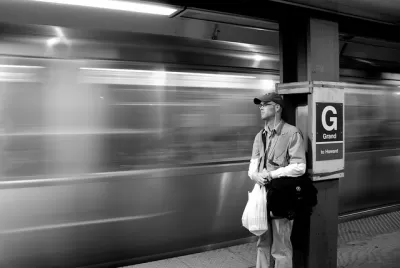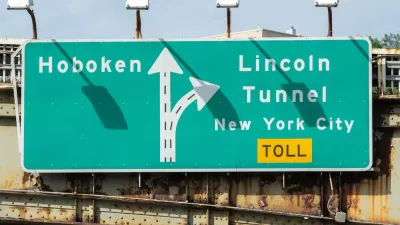A UK blogger argues that transportation infrastructure planning is informed too heavily by the kinds of trips men tend to make.

Streetsblog's Network Roundup picks up an analysis of U.K. transportation data that basing transportation infrastructure decisions on commuting.
In her blog spatial fairness, Katja Leyendecker cites data showing that nearly a quarter of trips made by men in the U.K. are for the purpose of commuting. But commuting takes second place for women, who tend to make more and shorter trips.
So planning transportation infrastructure primarily around commuting "undervalues trips by women, and contributes to a built environment that is poorly suited to women's needs," as Streetsblog puts it.
Leyendecker writes:
In order to make designs environmentally effective and create gender-inclusive networks, we need to incorporate all ways of travel in our assessments… By leaving out the women-type trips of shopping and visiting others, we could miss out on building useful networks on a neighbourhood level to make it possible to cycle quick errands, cycle with kids and transport shopping by bike.
FULL STORY: Focusing Only on Commutes Overlooks Women’s Transportation Needs

Maui's Vacation Rental Debate Turns Ugly
Verbal attacks, misinformation campaigns and fistfights plague a high-stakes debate to convert thousands of vacation rentals into long-term housing.

Planetizen Federal Action Tracker
A weekly monitor of how Trump’s orders and actions are impacting planners and planning in America.

In Urban Planning, AI Prompting Could be the New Design Thinking
Creativity has long been key to great urban design. What if we see AI as our new creative partner?

King County Supportive Housing Program Offers Hope for Unhoused Residents
The county is taking a ‘Housing First’ approach that prioritizes getting people into housing, then offering wraparound supportive services.

Researchers Use AI to Get Clearer Picture of US Housing
Analysts are using artificial intelligence to supercharge their research by allowing them to comb through data faster. Though these AI tools can be error prone, they save time and housing researchers are optimistic about the future.

Making Shared Micromobility More Inclusive
Cities and shared mobility system operators can do more to include people with disabilities in planning and operations, per a new report.
Urban Design for Planners 1: Software Tools
This six-course series explores essential urban design concepts using open source software and equips planners with the tools they need to participate fully in the urban design process.
Planning for Universal Design
Learn the tools for implementing Universal Design in planning regulations.
planning NEXT
Appalachian Highlands Housing Partners
Mpact (founded as Rail~Volution)
City of Camden Redevelopment Agency
City of Astoria
City of Portland
City of Laramie





























